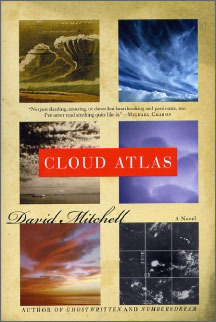 |
 David Mitchell
David Mitchell
Cloud Atlas
Reviewed by: Nazalee Raja © 2005
Sceptre / Hodder and Stoughton
Country Format Edition: UK Trade Paperback
ISBN: 0-340-82278-3
Pages: 529 Price: £7.99
Hardcover Publication date: March 1, 2004
Random House
US Trade Paperback Original
ISBN: 0-375-50725-6
Pages: 528 Price: $14.95
Publication date: August 17, 2004
Date Reviewed: 24 February 2005
Index:
General Fiction
Science Fiction
'Cloud Atlas' is David Mitchell's third novel, the first two being 'Ghostwritten' and 'number9dream'. 'Cloud Atlas', like 'number9dream', was shortlisted for the Booker Prize. 'Cloud Atlas' is an intelligently written story that employs originality to explore ways of story-telling which stretch the mind and imagination. At a basic level, 'Cloud Atlas' is a well written novel combining humanity, politics and philosophy in a book the reader will find hard to put down. On a deeper level, the novel provides much that we would do well to take on board and learn from.
The structure of 'Cloud Atlas' refuses to follow the conventional linear format. The novel is composed, like 'Ghostwritten', of several short stories. Unlike 'Ghostwritten', where each short story is told to completion, the reader of 'Cloud Atlas' is permitted only the first half of a short story, then given the first half of the subsequent story, and so on until the sixth and final story; the only one narrated in its entirety. The reader is then treated to the second half of the fifth story, then the fourth, and so on. The novel ends where it begins, with a pleasing and appropriate circularity. The format is less complex than it appears, and shows a masterful proficiency in storytelling.
The clever structure serves not only to heighten the tension, compelling the reader to read on in anticipation, but more importantly to highlight the way in which the past informs the future, and vice versa. The world is a product of its past, as people are products of their lives. Yet, as these stories show, humans do not always learn from their mistakes, and are still, tragically, capable of repeating them. 'Cloud Atlas' successfully explores and illuminates the human 'heart of darkness' with more power and clarity than any political or philosophical tract could have done.
Unlike 'Ghostwritten', where all the stories take place in a roughly parallel time frame, and are all set in the present, the 'Cloud Atlas' stories are set in different times. The first is the a nineteenth century journal of American travelling the Pacific; the second is in the form of letters written in the 1930s by a young English composer; the third is a political thriller set in 1975 and the fourth takes place at the beginning of the twenty-first century. The remaining two stories are dystopian visions of the future, demonstrating that present and future are linked and interdependent; that each civilisation inevitably declines after its heyday.
The characters in 'Cloud Atlas' are very human, three dimensional and fully realised due to the detail invested in them. Readers familiar with Mitchell's work will recognise a protagonists who appeared briefly in 'Ghostwritten' -- just as a minor character from 'Ghostwritten' featured in 'number9dream'. Mitchell creates characters we are compelled to care about, even when we know them to be charlatans or frauds; their flaws make them real and we empathise with them the more for this. Mitchell has an uncanny facility for stepping into the mind, of inhabiting the very skin, of his characters. He makes use of their vernacular to render character-appropriate speech patterns and dialogue, going so far in the sixth story to create not so much a dialect as a complete language.
Mitchell's faculty for conveying meaning, employing concision and originality, shows that he, like a character in the novel, "chisels out his sentences with care". This facility for accurately capturing the voice of a character, so that the prose style of each story differs, has the advantage of giving each piece an authentic feel. This, however, carries the inherent disadvantage that some of the stories are less easy read than others, until you become accustomed to the style.
The main theme of 'Cloud Atlas', and one of its unifying links, is the restriction of freedom and the derogation of rights, whether of the individual or a section of society, and the impact this can have not only on society, but also on history. "Once tyranny becomes accepted as ordinary", one character states,"its victory is indomitable". The novel illustrates this beautifully.
'Cloud Atlas' supports my view that an intelligent book can entertain as well as enlighten. The novel is littered with allusions to works of literature, science, economics and history that leave the reader informed and interested rather than daunted or intimidated. Moreover, each reference is a clue for the attentive reader, relating either to the themes or the plot of the novel. All of the component parts give the lucky reader a novel which is cleverly crafted and a very good read.
|
 |
